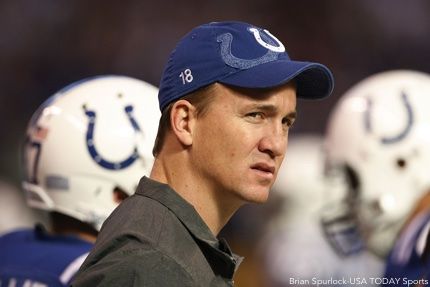In 1998, the Indianapolis Colts drafted Peyton Manning with the first overall pick. Manning went on to become the franchise leader in virtually every passing category, and he set many NFL records as well.
Just drafting Manning was not enough to change the direction of the Colts. The franchise needed to make one more move: Trading Marshall Faulk.
"I think what happened needed to happen," says Faulk, whose last year with the Colts was Manning's rookie season. "Basically, for Peyton to mature and grow into what he did -- it would have been my team. We somewhat shared the team in a sense. Me leaving, it allowed for him to really take over and be the guy that he is now."
Faulk was 25 in 1998 and made his third Pro Bowl in five NFL seasons. He was in his prime. The Colts were not. Indianapolis went 3-13 in Jim Mora's 1998 debut season. Manning set rookie records for both touchdown passes (26) and interceptions (28), playing all 16 games.
A training camp holdout in 1999 gave the Colts justification for trading their superstar. Faulk moved on to the Rams, and the Colts ushered their first-round pick, Edgerrin James, into the starting running back role. Faulk won a Super Bowl in St. Louis in 1999, and reached another in 2001. Manning and the Colts built a foundation that would send Indy to the postseason 11 of 12 years from 1999-2010. Manning won his lone title at Super Bowl XLI.
Faulk says he does not ponder a parallel career with Manning in Indianapolis. Everything seemed to work out for both.
"He was just a guy who was sure of himself, who understood exactly what he wanted to do, what he wanted to be, and basically where he was going with his career," Faulk says. "What he has done is basically what he wanted it to be. It's been scripted."
Faulk played a crucial part on "The Greatest Show on Turf" Rams team. That team played a critical role in building such offenses as Peyton Manning's in Indianapolis, Tom Brady's in New England and Drew Brees' in New Orleans.
Faulk believes his team's template and some pass-friendly rules have allowed for the league's air game to open up.
"I wasn't really in this business of analyzing when I played, but just looking now, a lot of teams look like it now because of the rules and how you get to play," Faulk, said of the legacy of "The Greatest Show on Turf. "A lot of teams put up a lot of points, throws for a lot of yards and look like what we looked like because the rules allow them now."
Faulk won Super Bowl XXXIV, but the Rams dropped Super Bowl XXXVI. He remembers one "more" than the other.
"The one I won. The glass is always half full with me."
Faulk, now an NFL Network analyst, spoke to ThePostGame on behalf of Verizon.
-- Follow Jeffrey Eisenband on Twitter @JeffEisenband.






